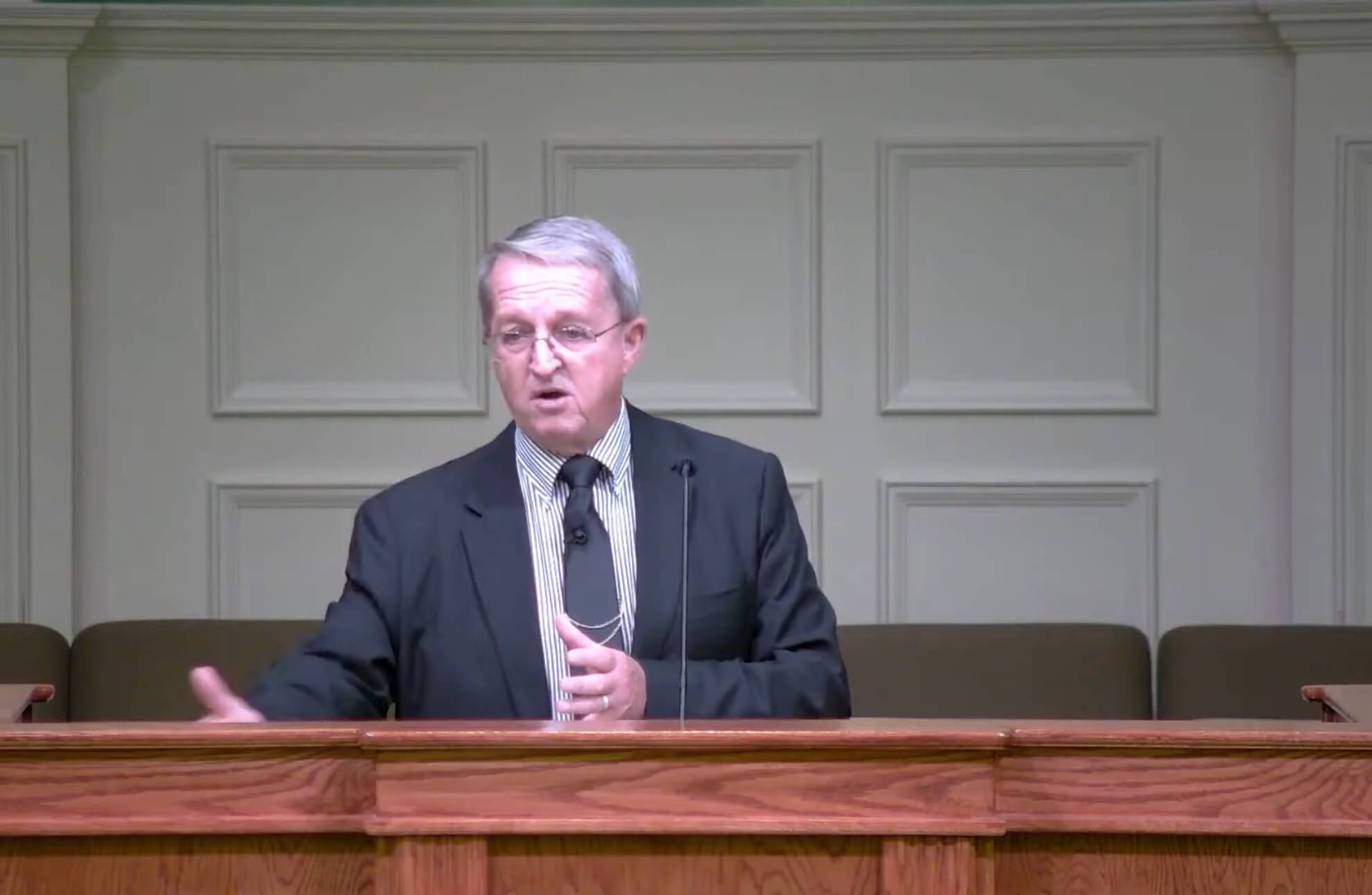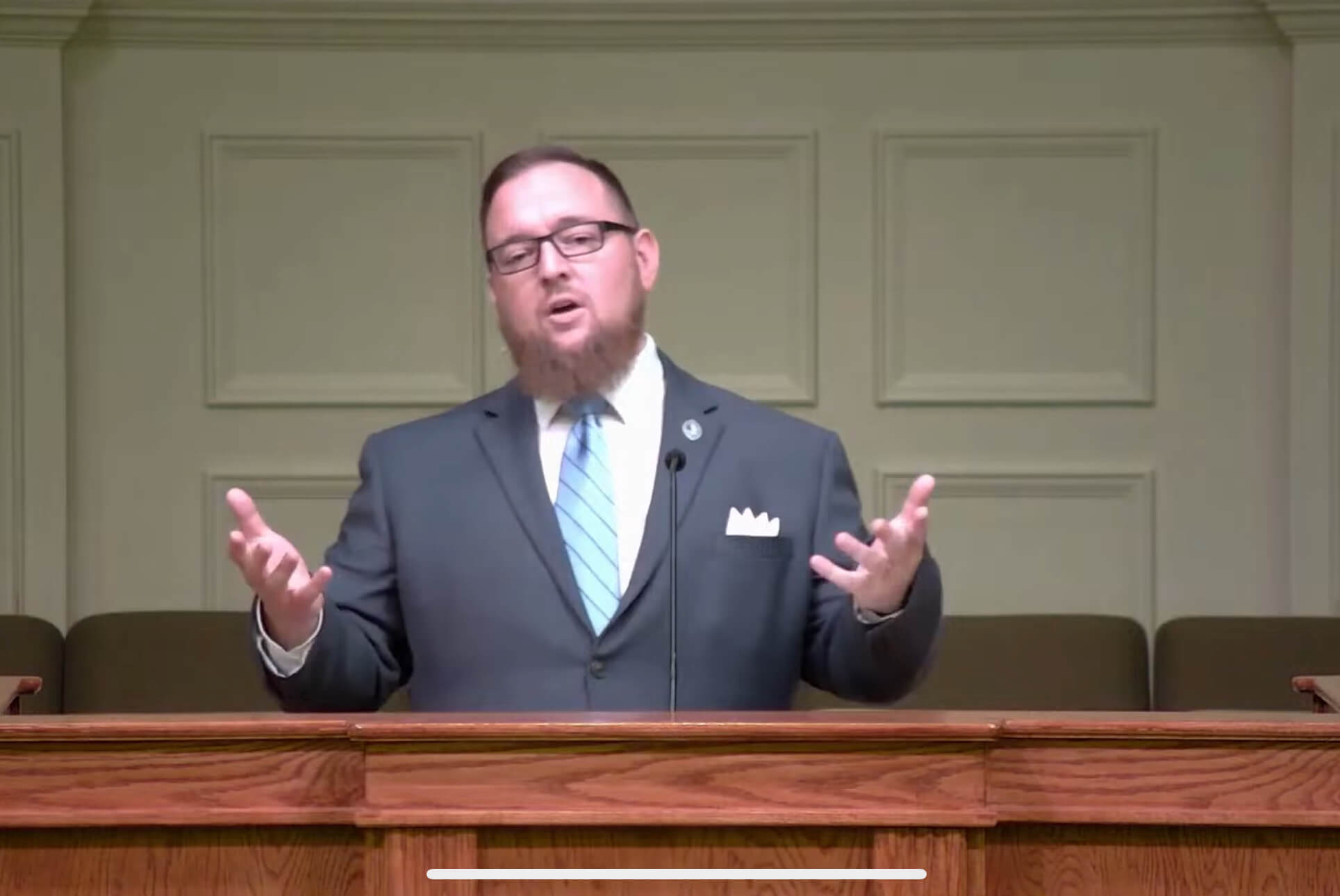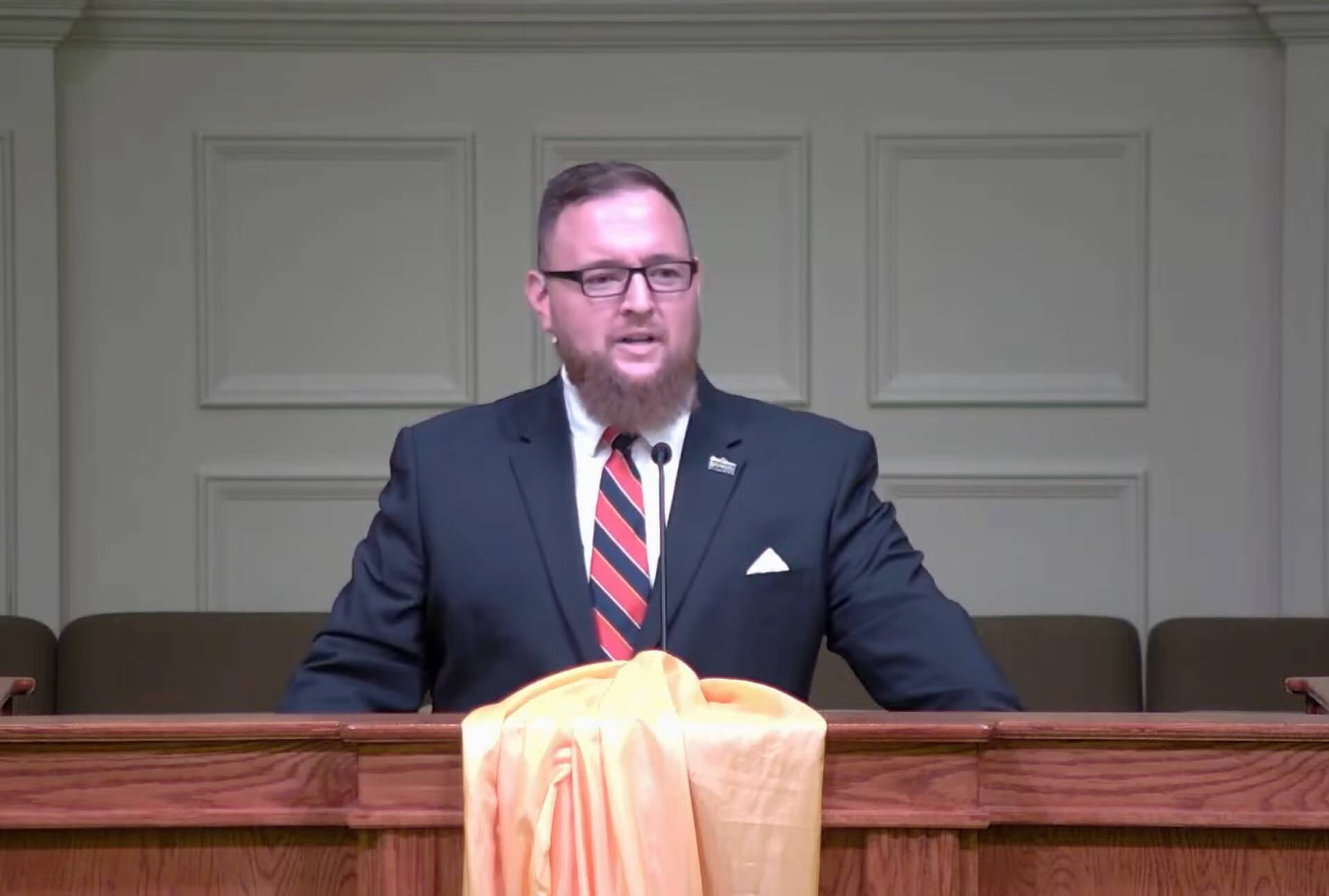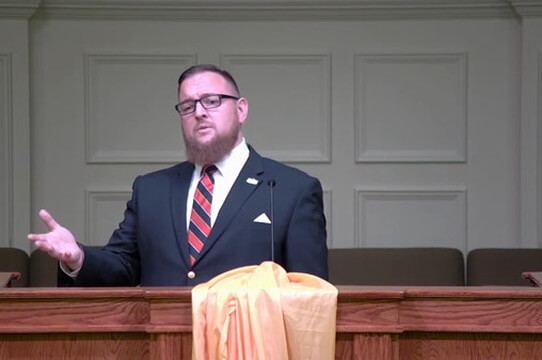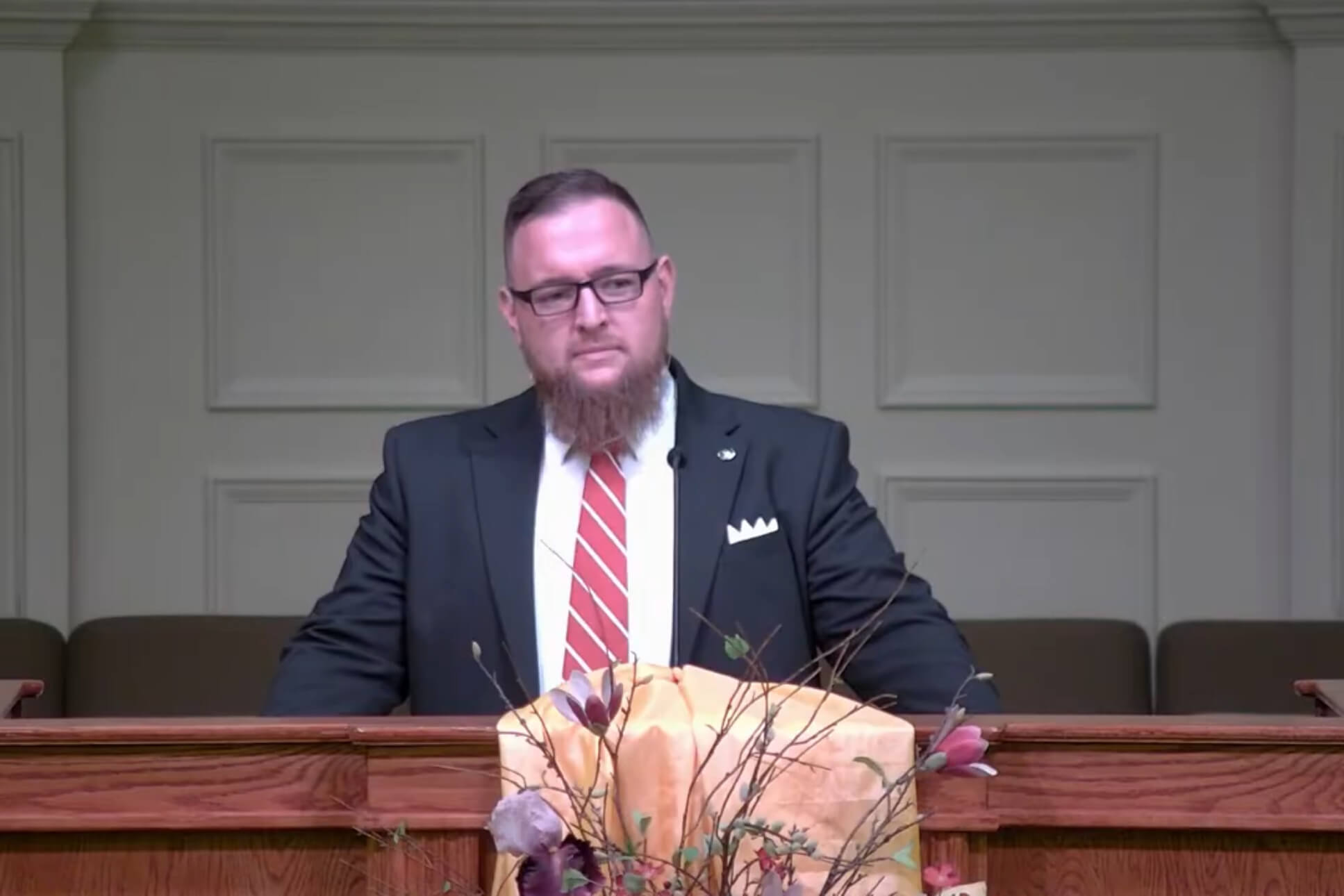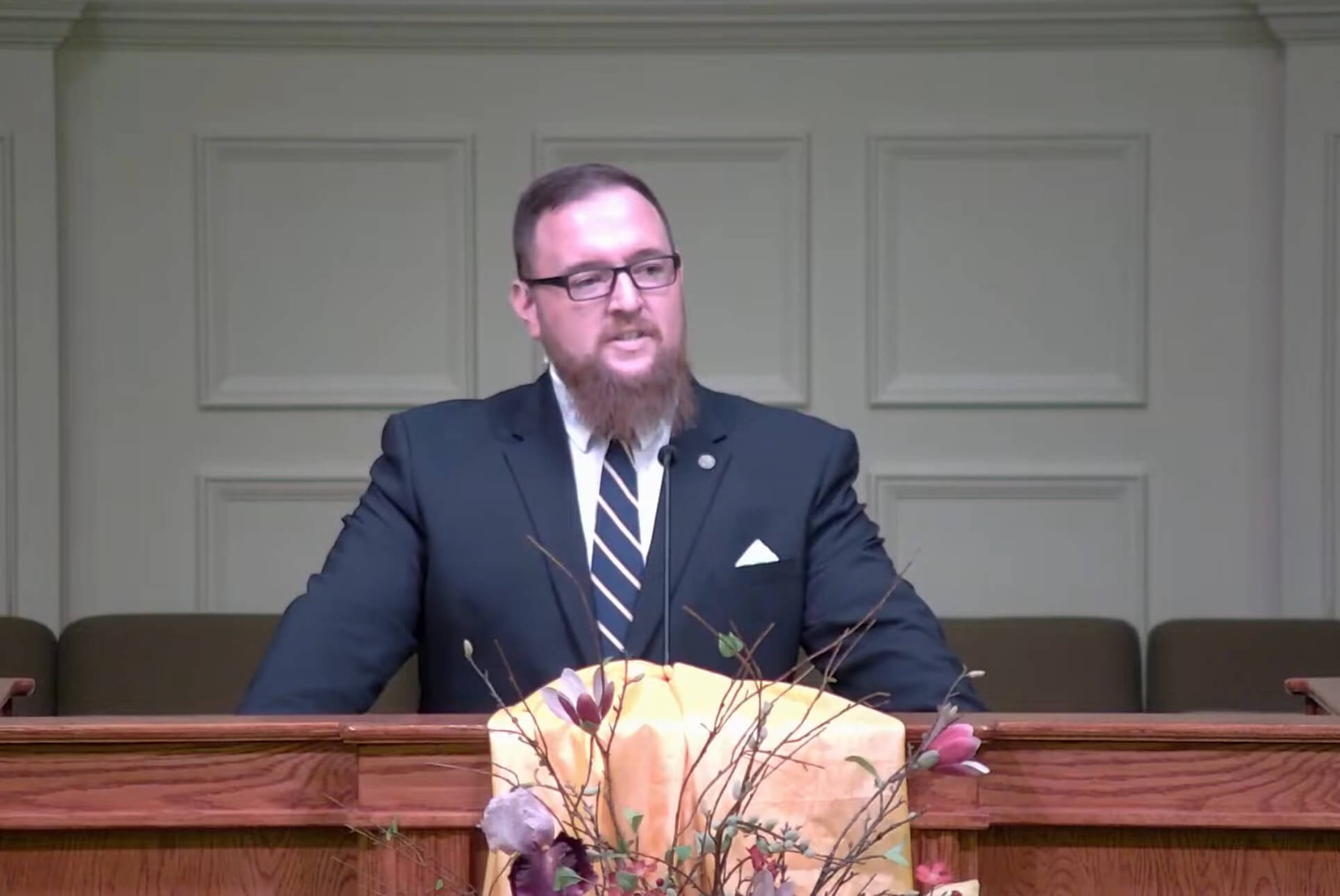Video
“A Charge Given to the Rich”
1 Timothy 6:17-19
Pastor Richard C. Piatt II
10/06/24
Audio
Transcript
We’ll take your Bible in whatever form you have it there, if it’s on your phone, on a laptop, or tablet, or the written pages of en palm paper, and turn with me to the epistle of 1 Timothy chapter six.
The epistle, this will be the last for right now of 1st Timothy, though we may come back to one more passage. in the days and months ahead. But as we’re been going through these two epistles written by Paul to Timothy, giving him several charges of what to do, how to conduct himself, and how to have others conduct themselves in the household of faith, as discussed there in chapter three and four, five, and so forth. And he gives instructions to the young preacher, Timothy. It appears that he is either just at the tail end of the Book of Acts getting out or is out of prison. And there’s some freedom there. He’s expecting to go and to see Timothy.
However, 2 Timothy that we’ll begin in a couple of weeks when I return that it’s a different story. It appears that Paul would have been arrested again. I do opt for a second imprisonment. And the tune is a little different. It’s, I’m ready for my departure, is at hand. And it’s a little bit more intense. It’s a little bit more reflective. And it has within it, even more urgency than what First Timothy has. First Timothy has a lot of urgency to it because Paul dearly loved the church at Ephesus where Timothy is at. And they were having some difficulties. He was sent there to set in order the things that needed to be taken care of just like Titus was on Crete. And so there’s a sense of urgency in First Timothy and Titus. but there’s a lot of urgency as far as concern and basically boils down to the fact that the apostolic age is coming to an end and he wants to really bear down and to bring home the message of what he wants to accomplish and what he feels is important for the local church. And hence, I think it’s important for us in our day and age, technically it’s important in every day and age, but especially now.
Especially now for a lot of reasons. And what I find is, is that churches oftentimes, they’ve simply lost their focal point. And what is the purpose of the church, how we’re to conduct ourselves and the like. And so we need to always come back and to see just exactly what we have here. Well, when we come to chapter six, And beginning at verse 17 through 19, we find that Paul is addressing another group of people within the particular church. And we have seen that. He has already given some instructions on the selection of elders, of deacons in chapter three. He’s talked about in chapter two how to conduct worship services. That’s one of the passages we would turn to that would say that women are not to be preachers. Women should teach women, women can teach children. There’s a place for all of them, but not in your supreme authority or teaching men. And that’s just the Apostle Paul given the instruction by way of the Holy Spirit.
Chapter one talks about the importance of sound doctrine. And then when we get to this last section, he’s taken different groups of people. He talked about in chapter five, those of the older man and the older women, the younger men and the younger women and how they ought to be handled. He talks about widows and the way that we have and that’s one reason why I committed the widows of our church to prayer because the church has responsibilities. And I’ll just put that as a bit of a bug in the ears of all the deacons as well that, you know, to maybe call your widows this week, either before or during or after the hurricane, because they are alone and they need special attention. But he talks about.
Let me just pause to say, the text of the Bible does not say, call your widows on their phones, okay? Lest you think I’ve just totally lost it. You know, just pay attention to them would be the idea there. But then we have the idea of honoring elders, we have the idea that elders can sin, and therefore that sin needs to be observed, but there’s ways, before two witnesses, and then rebuke before the church. We have the idea of instructions given to masters and slaves, mostly to the slaves, but to the masters too. on what that kind of relationship is and how they ought to be conducted. Then he finally went back after that and he addressed Timothy again in verse 11 of chapter 6. But you, O man of God, flee these things. And in that context, It comes back and he addresses something and and then it’s going to be.
I think it was John MacArthur referred to this as a a spirit filled worshiped digression. That’s a way of getting around the fact that it looks like Paul forgot something and one more group of people because you would normally think he’d end up with the man of God. But he’s got one more people he wants to address. It’s the rich.
Now you might be out there sitting saying, oh yeah, I don’t have to worry about this sermon because I’m not rich. May I just propose to you that in light of the Christians throughout all of church history, everybody in this room is rich. With what we have in our homes and our savings accounts, now some have more than others and that’s okay. And in fact, that’s really okay because that is representative of a biblical church. But we’re all rich, as according to some of the… the poor of the New Testament and throughout church history. So don’t write that off. But it also then gives us an idea of how, as Christians, we ought to conduct ourselves. We’re gonna come to that in a few moments.
So he’s gonna address that after he then tells the man of God to flee, follow, fight, and to be faithful. And that is what we looked at the last time we were together. But this morning, we’re gonna pick it up at verse 17. Follow along as I read. Command, I’m gonna pause, first word. This is Paul telling Timothy what to do as the pastor of the church. He says, I want you to go. I want you to command. I want you to instruct. I want you to let the rich know, because this is what he says. Command those who are rich in this present age not to be haughty. OK, nor to trust in uncertain riches, but in the living God who gives us richly all things to enjoy, let them do good. that they may be rich in good works, ready to give, willing to share, storing up for themselves a good foundation for the time to come, that they may lay hold on eternal life.
Now, so let’s come back here and take a look at this particular passage. As we just got back from Colorado, we went out there and spent about 10 days, well, maybe eight days, nine days, that we were with Lee and with the Lees, Danny and Leela. And we went around and we did all kinds of trips and so forth. And one of the days, we did what was known as the loop. And it’s the loop that, well, we were staying close to, say, Durango. It’s where we ended up and then went to their house. But it takes a big loop, and it goes through Riverton, maybe some of those. Some people would know where that’s at. But we went to what was called Telluride.
Now, I know that probably some of you only know that as a vehicle that people drive, as a family vehicle around an SUV. But Telluride is a very beautiful place up in the mountains of Colorado. And we went and we’re driving in all of the mountains to see the beautiful leaves and being thankful that I didn’t have to rake them is what I was at. You know, I don’t miss that at all. And so, but we were watching all of that. Well, we went to Telluride, and then, which is par for the course for me, I’m always looking for a good deal, and free is one of the best deals ever, that they have a free gondola that you can ride, sky lifts, which normally can carry people that wanna go skiing and things like that. But they have a ride that you go up a mountain and down, and you go over to Riverton, which has some of the biggest doughnuts I’ve ever seen. That’s a sideline issue. And so we went over there and it’s a place.
Well, what can I say? It’s a place where a lot of wealthy people live. A lot of people. They have just recently they have all kinds of magazines that talk about just them and their their facilities and that Tom Cruise decided it was growing too much. And then he sold his place, just missed him. And so didn’t get to see Tom Cruise, but I did see some pictures and saw some mansions. One just recently sold for $20 million. So if anyone’s interested, I can show you some property out there and I’ll give you a cut rate on real estate.
But anyways, a place of wealth, a place where there were a lot of people with a lot of money. And that’s not to say that that’s wrong, but it’s just to say that this was a very, very special place. Simon and Garfunkel, I think it was more Simon that wrote a song once called, as he went to Africa and talked about the wealth of some as opposed to the poor of the others, he had a song that he had written about diamonds on the soles of her shoes. Now, some people have a hard time understanding what that’s all about, but if you have diamonds, which is very, very wealthy and a special gem, and if you have so much of them that you just use them as the sole for your shoes, it is the showing of being what we would sometimes refer to as filthy rich. And even that comes across as a judgmental thing, as if riches or having riches is filthy.
Well, from a Christian worldview, how are we to view wealth? Well, he’s already addressed that. And he tells us that a pastor has to be careful of you flee these things. But what did he say earlier in the midst of this? And in this passage, when he addresses the issues of and command those that are rich in this present age, he doesn’t say that it’s wrong to be rich. But riches and being wealthy carries with it some unique circumstances that can cause a person to be what they’re not supposed to be. Paul addresses Christians that are legitimately rich. Those that are God’s people that have been blessed financially.
People like Abraham. You know, he was a very wealthy man. People like Job. Job was a very wealthy man. Solomon, I have a feeling that Solomon was probably the wealthiest man that ever lived. But in the New Testament, Lydia, Dorcas, Philemon, we sometimes don’t think of them as being wealthy, but yet some of the things that they were doing and with the wealth that they had, their activities, Philemon was a slave master. Onesimus and so forth. And what was going on? You couldn’t do that if you were poor. And so at the very onset of something that is overarching on the whole message today is this. Some people get the assumption that riches is evil or being wealthy is evil.
From a Christian worldview, there’s nothing further from the truth. Now it does brings with it certain temptations and certain difficulties that one needs to be approached. But within the local church and within this is the last group of people that he addresses. The local church there in Ephesus was made up of rich people, hence our passage here. But it was also made up of slave owners and slaves. It was made up of widows. It was made up of the elderly and of the young. In other words, it was not a homogeneous unit that wasn’t all in one sort of group. And yet, so much of our current church growth gurus, they keep saying, find a homogeneous unit and target your audience and to go for them.
That’s one reason why I so appreciated one of my mentors, R.C. Sproul, now with the Lord, when he said, your target audience is God. for all of us here today. We are to bring our, you’re to be looking to God. You shouldn’t be just looking at here and me or me, but rather our target audience is God. We come to the Lord’s table as an audience unto one, unto God. But that those of us that then as we gather as a local church is very diversified and various diversification even with those that have some money.
We have the fact of things like Matthew chapter six where it says, lay not up for yourselves treasures on earth. We’ve got the gospel of Mark that says, what if it profits a man? You know, and he gets all this, but he loses his own soul. Luke talks about the man that has barns and he keeps building, building and building. So what is the proper view of money? And this is all in the early preparation of this that’s found over in earlier in the chapter. Verse eight, for example, it says, and having food and clothing with these, we shall be content. But those who desire to be rich, they fall into temptation and a snare and into many foolish and harmful lusts, which drown men in destruction and perdition. For the love of money is the root of all kinds of evil. for which some, notice he doesn’t say all. which some have strayed from the faith, and their greediness, and pierce themselves through with many sorrows.”
Well, the proper view of money, let me just quickly review this so that we can then have the setting when he says, now, command those who are rich not to be haughty, and then what they are to do. Well, having money in and of itself is not wrong. 1 Samuel 2, verse 7 says, the Lord makes the poor and the rich. Money is a gift from God, Deuteronomy chapter eight and verses 11 through 18. That there is power into making wealth. Believers are to be willing to part with their money, Job 121 is what he had to do. But those who have money must not be given to special treatment, James chapter two in the local church. That if a rich man comes in, he says, oh, come sit here. And if you’re poor, oh, go sit over there. Where dwells the love of God in any of that?
Those who have money must not be proud nor seek security from it. That’s really going to be what our passage is going to address. One must not have the making of money as one’s highest goal. Seek ye first the kingdom of God. And his righteousness and all these things will be added unto you. Money should be invested in eternal issues and money must not be hoarded. Now those are some basic principles, you can go different places in the Word of God and that’s a bit of a review in that earlier section. When a person is more concerned with making money than with honesty and truth, that would be an error.
Those who love money and they never have enough, that would again be discouraged in the scriptures of sin. Those who have money and tend to flaunt it. Those who have money and resent giving it. Those who have money and are willing to sin to either get it or to keep it, like cheating taxes. All of that, you see, You can’t cheat on taxes if you don’t have any money to pay taxes on. But our attitude towards money, things that we’re willing to do to keep money and all of that, there’s certain temptations to those that are rich. The results of money, it can result in sinful entrapment, because it even says here in verse nine, but those who desire to be rich fall into temptation and a snare, and into other areas of destruction. It can result in ruin and judgment, it can result in wandering in the faith, and it can result in a totally ruined life. when one is a lover of gold and silver rather than a lover of God. Well, it has a lot of temptations, a lot of possibilities of sin. But what’s the instruction that he’s going to give?
Well, after he has given his words of instructions to the man of God, after we have the doxology of worship at the end of verse versus what is it? Fifteen, sixteen. We come now to verse 17. And it’s as if he says, oh, yeah, I’ve got one other thing to do. One other thing to charge you. So Paul charges Timothy in four areas to command the rich. in the church. What is he going to do? The first one is this. Wealthy Christians should not be high minded. Wealthy Christians should not be high minded. Command those who are rich in this present age not to be haughty. not to be haughty. The word haughty, I don’t know, that’s probably not one of those words that you used this past week, and it’s one that we don’t use a lot of, but the idea there is it’s a compound word that means high-minded. It has the idea to think lofty of, to be proud. Some translations have even translated to be conceited.
You know, we sometimes make jokes about, you know, well, I’m going to go to tea today, and Buffy and Tad, ta-ta, and the little finger out, and we kind of make, it’s that idea that, you know, we’re jolly ho and, you know, have a great day, all those kind of things that seems conceited, to have an exalted opinion of yourself, to have an air of superiority. One way to picture it is those that either have high brow or high You know what that means, a high nose, walking around with their nose up in the air as if I’m always looking down at you poor peons that how dare you only drive a Chevrolet while I get into my Porsche or whatever it is.
When we become boastful, puffed up because of what we have, Now there’s just some very practical reasons. Number one, what you have may not always be what you end up keeping. And what you have may end up turning you into a noose and struggle the very life out of you. Or that you begin to think that you have the blessing from God when it’s only the blessing from Satan to keep you from God. One needs to be careful about the attitude that we have towards wealth, towards assets. We’re talking about things more than just money. I think here he’s talking about the whole the whole idea. But when he says command those who are rich and there were rich in the church and they were not all bad and it’s not bad to be rich and in a church. But he gives the instructions command that in this present age, if you’re rich, not to be haughty or to look down upon another. Now, why would he give that command? Because that is an easy thing for the rich to do.
So we need to be careful that whatever we have in our possessions, assets and money, that you understand something. That was given to you by God for stewardship. And you may be blessed, others are blessed more, but God doesn’t cause you to be a steward over the assets of other people. He is gonna hold you accountable for the assets that you have and your attitude towards them, your attitude towards others that don’t have what you have, either more or less. And he’s also gonna hold you accountable with what you’re doing with your assets. That one is up and coming. So wealthy Christians, should not be high-minded.
Secondly, the second thought, that wealthy Christians should not trust in their riches, but rather trust in God. There may be those that are trusting in the insurance company if the hurricane hits, or you’re trusting in the fact that you’ve got a block house as opposed to a frame house. And I only paused to use this as an illustration, but it’s one that I think that is really true. And that is, you know, those up in Tennessee and the Carolinas, who would have thought that a hurricane would wipe out cities and homes? They might have been trusting that being in the mountains was safe. It’s not. That’s the reason why we sang that song, you know, that Christ is all I have, but Christ is all I need. That we need to understand, we need to trust God, not in riches or our assets or the things that we have.
We sometimes get so caught up materialism we forget about we worship a God who is spirit and we worship him in spirit and in truth wealthy Christians should trust not trust in their riches but rather in God notice what the text says command those who are rich in this present age not to be haughty Not to look down, not to be proud, not to be boastful, nor command those who are rich not to trust in uncertain riches. Hey man, did you see the stocks? They really went up.
Or if President so-and-so gets in, the stock market’s gonna flare. Maybe, maybe not. And what does inflation, you see, we get so caught up in what’s, Don’t trust in uncertain riches, but do trust, is what the text would say, but trust in the living God. Riches carry uncertainty. With riches comes danger. Proverbs 11, verse 28 says, he who trusts in his riches will fall, but the righteous will flourish like foliage. We should trust in a good and giving God, the originator of all wealth, because notice what it says, but trust in the living God who gives us richly all things to enjoy. And so it isn’t wrong to have riches.
It is wrong to trust in those riches and think that if you just have a big bank account that you’re gonna be okay. Because as it comes, it can go just as quickly and it can be removed. Secularism, materialism does not understand that. We’ve all seen and heard those little phrases like, he who dies with the most toys wins. In what universe does that really make sense? You know, when you die, it doesn’t make any difference how much you have in the bank. It doesn’t make any difference what kind of a car you own. But it does make a difference if you are ready to meet the living God. And Christ is all I have, and he’s all that I need.
We’re gonna close today in preparation of the Lord’s table, you know, his robes for mine. My robes, the only thing I contribute to my salvation is my sin. Yet he gives me his robes of righteousness. That’s what I really need. It’s not wrong to have riches, but it’s wrong to have riches. And you’re so trusting them, you forget how important it is to trust Christ. And just simply thank him for giving you what he has given to you. Because as it says here, who gives us richly all things to enjoy. Is it wrong to enjoy money, riches? No, he’s given it to us to enjoy. But not to trust in. Not to trust him.
Well then, am I just supposed to be a hedonist and have all kinds of fun with, consume it all upon my lust and whatever I have? Well, you might think that, except for the fact the text doesn’t stop there. Notice what he goes on to say. Who gives us richly all things to enjoy. Then at verse 18, he moves on to the third area. Wealthy Christians should be good stewards. Let them, and the them would be the rich, let the rich do good, that they may be rich in good works. Ready to give, and then he defines that. Well, what is that? Ready to give, willing to share.
So wealthy Christians should be good stewards. The word there, to do good, it’s interesting, where you would think that would be a pretty common word, you’ve seen that other places, but in the Greek, that is a hypoxlegomenon, a one-time occurrence there, and it means that a person that has wealth should do things that are inherently good, intrinsically good, noble, excellent, excellently good.
James chapter 2 verses 14 through 17 talks about true religion and how to handle that. First John chapter 3 verses 16 through 18. That was the one that the Spirit of God so drilled at home in my heart when I was in Haiti and I saw the two port-a-potties that 169 boys were supposed to use in the orphanage. And I just looked at that and literally burst into tears and asked Prediston, what would it take to build those, you know, to build restrooms for these boys? And when he told me, it sounded like, I forget now, I think it was around $3,000, and I had just given him some money that we had sent down to feed him. It was as if the Spirit of God screaming in my ears using the text, I haven’t gone charismatic, but screaming in my ears. And it was like life went in slow motion. And I just had to say, build them. I don’t know where that money’s gonna come from. Fellowships, they’re giving, I’ll give. It doesn’t make any difference. I told him, I said, this is simply not acceptable in my presence. Not as if my presence is any big deal. But at the idea, see, it was, it’s intrinsically, powerfully, I must give this to this issue. And that’s the idea that is here.
Let them do good. Well, what does that mean? Be rich in good works. You see your brother have a need, and God’s given you the wherewithal to meet that need, 1 John 3, and God’s given you the wherewithal to meet that need, and if you don’t give it, where dwelleth the love of God in you? You must. Now, we can’t meet every need in the world, but there are certain needs that we can, and those that have wealth of whatever degree, God is not gonna tempt you in those areas to feed all the poor or all of that. But there may be opportunities that you have. And I can praise God for Fellowship Baptist that the end of communion today will receive a benevolent fund offering. And we’re always very specific to try to come alongside to bring encouragement. But you see, we are a people that we’re a blessed church financially. And we need to be careful not to trust in that, but we need to give to those that are in true need. Ready to give, willing to share. And as we do that, we are being good stewards.
The fourth area that he mentions here then is the wealthy Christians should be storing up treasures for eternity, being rich in good works, or with the view of eternity in our involvement. In giving with the idea of eternal banking, spiritual deposits, He goes on to say this. Let those do good that they may be rich in good works, ready to give, willing to share, storing up banking. It’s a banking term, banking up, storing up for themselves a good foundation for the time to come that they may lay hold on eternal life. Now, you’re not saying you do this to get eternal life. You get you receive eternal life through the finished work of Jesus upon the cross. but then you receive another Lord. You are no longer Lord of your life. He is Lord, and he wants you to make eternal investments for the glory of God.
There was a little boy, we have to hasten because of going to the communion table, but there was a little boy that when he simply asked, he said, it was a poor boy in an orphanage, and he said, they asked him, says, well, what would you like for Christmas? He said, I’d like a bushel of apples. And someone thought, oh, you know, he’s so hungry, he won’t do that. And so some families got together and they gave him a bushel of apples. And you know what he did with them? He gave them to all the little boys and girls of the orphanage. It’s this idea of understanding that what I have has been sovereignly deposited with me with view of enjoyment. Nothing wrong with that. but it’s also with view of making an eternal investment for the glory of God, not lording it over or looking down upon others who are not so blessed, but using it to make an eternal deposit for the glory of God. May we be found faithful in stewards. He wanted the rich of that first century church One more message to a group of people in that church. We are to be held responsible for our stewardship.
Let’s pray. Our Father in heaven, how we thank you and praise you for the stewardship that you allow us to make an investment. As we support missions around the world, we make that investment. As we make investments with respect to our congregation here, with respect to people and their education. Father, in the midst of all of these things, may we understand and know that we’re stewards with the great blessings that you have given to us. May we be found faithful. Now, as we turn to the table, May we be reminded of our glorious salvation found alone in Christ as there has been an exchange of my sin upon Christ as my sin bearer and his righteousness bestowed upon us in robes of righteousness for his glory. Father, may we realize we are truly a rich people. Use us for your glory, in Jesus’ name, amen.
